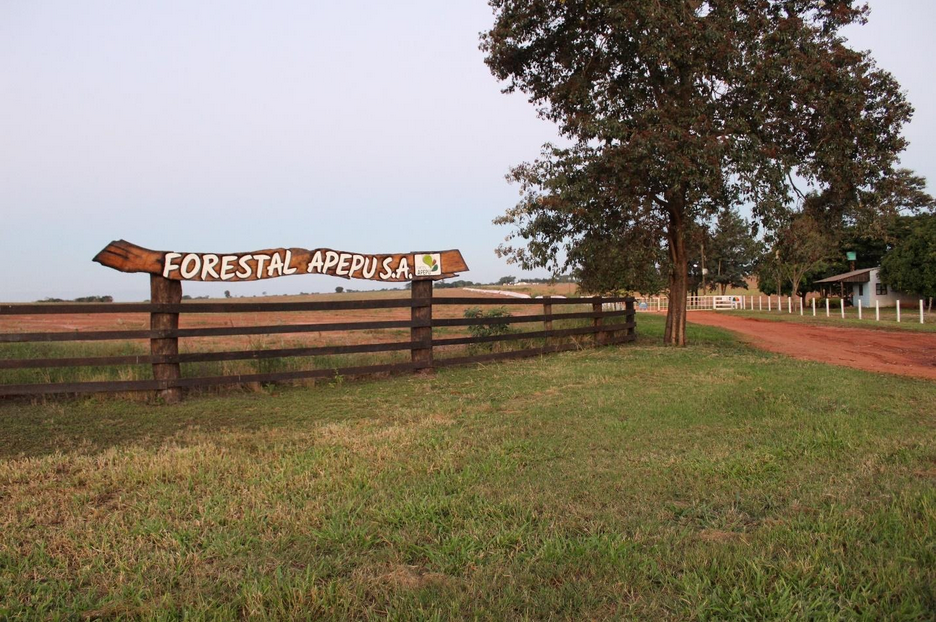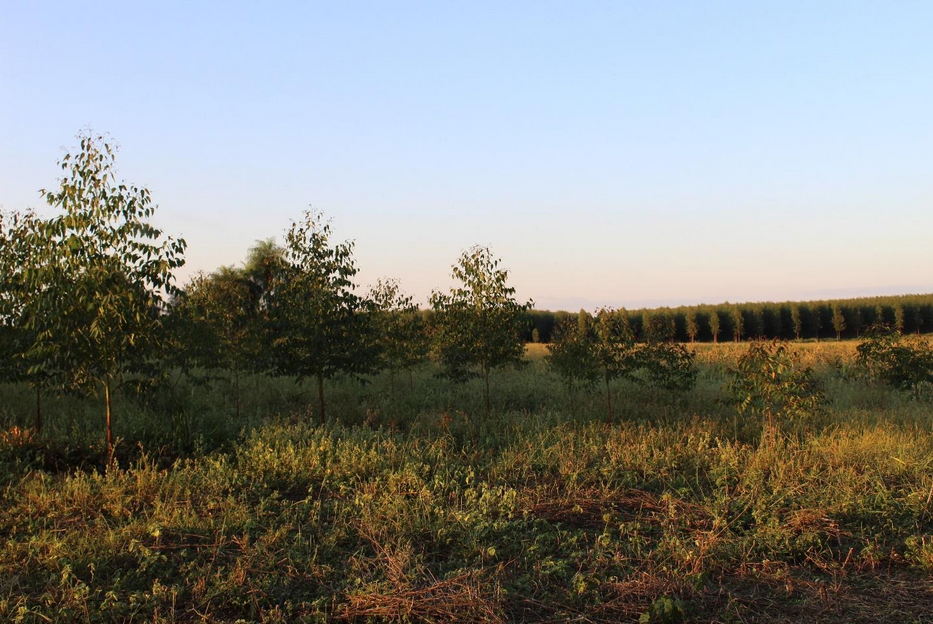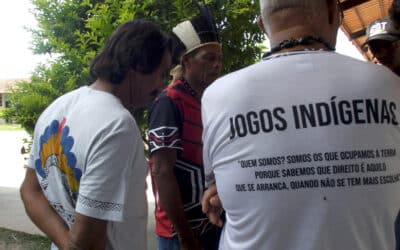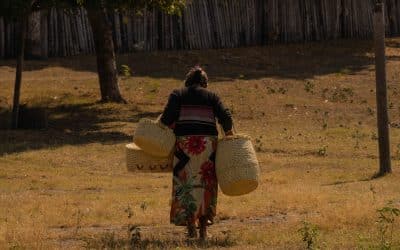Avec le soutien financier du Fonds vert pour le climat (FVC), le Fonds Arbaro cherche à investir dans 75 000 ha de plantations d’arbres en monoculture au sein de sept pays cibles en tant que solution « d’atténuation du changement climatique ». Le fonds Arbaro a déjà trois investissements dans des sociétés de plantation, deux au Paraguay et un au Ghana et en Sierra Leone. Cette étude de cas est basée sur une enquête menée par Omar T. Yampey, chercheur au Centro de Estudios Heñoi, sur Forestal Apepu et Forestal San Pedro au Paraguay, ainsi que sur les impacts profonds de l’expansion des plantations d’eucalyptus en monocutures sur les communautés paysannes.
With the financial support of the Green Climate Fund (GCF), the Arbaro Fund is looking to invest in 75,000 ha of monoculture tree plantations across seven target countries as a « climate mitigation » solution. The Arbaro Fund already has three investments in plantation companies, two in Paraguay and one in Ghana and Sierra Leone. This case study is based on an investigation by Omar T. Yampey, researcher at Centro de Estudios Heñoi, into Forestal Apepu and Forestal San Pedro in Paraguay, and the profound impacts that the expansion of monocutlure eucalyptus plantations is having on peasant communities.
Download the case study (English | Spanish)
Download the full investigation (Spanish)
These are not forests: The Arbaro Fund and monoculture tree plantations in Paraguay
As in other South American countries, plantation forestry has grown considerably in Paraguay in recent decades. This has brought with it well-documented impacts on biodiversity, the water cycle, the nutrient cycle, and soil health, as well as on the health and wellbeing of communities. Monoculture tree plantations are billed as “profitable and sustainable”, but they are clearly harmful to ecosystems as they reduce diversity to just one species. In contrast, native forests are complex self-regenerating systems that encompass a multiplicity of biodiverse elements.
Since 2018 Paraguay’s current President Mario Abdo has promoted investments in the forestry sector, establishing a forestry credit line through the National Development Bank, enacting a law that opens the export of timber from plantations of exotic species to international markets, and approving the construction of a large pulp mill by the company PARACEL. This process has been accompanied by intense lobbying by the private sector, represented mainly by the Paraguayan Federation of Forest Harvesters (FEPAMA). In coordination with state institutions, these lobbyists have been repeating the mantra of the profitability of eucalyptus plantations and claiming that they will generate jobs, wealth for the country, and environmental sustainability. Meanwhile, local groups say otherwise, such as the Qom Indigenous community, who have resisted the seizure of their lands for eucalyptus plantations.
Currently, the main industrial demand for biomass in Paraguay is to produce charcoal for grain drying. Paraguay is the fourth largest exporter of soybeans in the world, and drying the soybeans before they are stored in silos requires more than 500,000 tons of wood to be burned each year. A similar quantity is required for drying wheat, maize and other grains. Another strong connection between agribusiness and eucalyptus is the fact that in the east of the country eucalyptus plantations are either replacing cattle pasture and industrial soy monocultures, or being incorporated into silvo-pastoral systems. In either case, the land is locked-in long term to another unsustainable and ecologically harmful land use.
An additional significant consumer of wood and charcoal in Paraguay is the ACEPAR steel mill, which uses around 600,000 tons of wood a year. Future demand for wood from the PARACEL pulp mill will also require large new areas of eucalyptus plantations. These industrial consumers of eucalyptus mean that wood in plantations in Paraguay is most likely destined to be turned into charcoal and burned, or turned into short-lived paper products.
The Arbaro Fund’s GCF-backed investments in Paraguay
The Green Climate Fund (GCF), the UN Climate Change Convention’s financing mechanism, has provided approximately $102 million to four projects in Paraguay to date. This includes signing a highly-controversial $25 million equity agreement with a Germany-based private equity investment firm in 2020, the Arbaro Fund, to support its plans to invest in 75,000 hectares of new tree plantations across seven target countries in Latin America and Sub-Saharan Africa. The Arbaro Fund was founded by two other German companies, the private consultancy UNIQUE Forestry and Land Use Gmbh, and investment management company Finance in Motion.
An open letter to the GCF Board signed by 234 organizations from various continents strongly opposed Arbaro’s application to the GCF based on historical examples of the harm caused by industrial tree plantations to ecosystems and communities in different countries. The project was critiqued for social, economic and environmental reasons, on the grounds that plantations do not bring benefits to communities and instead cause land conflicts. CSOs also criticised the fact that plantations only create temporary and poorly paid jobs, and that they are an “environmental disaster” due to a number of factors, including the indiscriminate use of fertilizers and agrochemicals that pollute water and soils. Hydrological stress is another significant impact, especially in a country such as Paraguay where climate change is resulting in both drought and extreme flooding events due to changing rainfall patterns.
The project’s opponents also denounced Arbaro’s flawed claims that 20 million tons of carbon would be captured by the project, since plantations involve “land clearance before planting and the displacement of the former land use into forest areas, a loss of soil carbon and productivity over time due to erosion and nutrient exhaustion, and the fact that a significant proportion of the wood is very likely to either be burned as charcoal or biomass, or in wildfires that are made more intensive and extensive by large areas of plantation.” Numerous scientific papers based on research in South America have also refuted claims that tree plantations are effective carbon sinks (see for example here and here).
Arbaro’s two investments in Paraguay are Forestal Apepu and Forestal San Pedro, and their plans for expansion were approved by the GCF investment committee in December 2020. Arbaro has fully owned Forestal Apepu since 2019, and the company will establish 6,059 ha of eucalyptus plantations in areas previously used for cattle ranching and commercial agriculture in the Department of San Pedro, which has one the highest rates of deforestation in Eastern Paraguay and the nation’s highest rates of poverty and extreme poverty (43.7% and 10%, respectively). Arbaro established Forestal San Pedro in 2021, and the company manages 6,270 hectares of eucalyptus plantations, with plans to establish another 1,730 hectares on leased land, mostly in the department of San Pedro. Some of the plantations are silvo-pastoral, where tree planting is combined with cattle ranching.
Unique and the intensive livestock sector
Arbaro’s co-founder and part owner, UNIQUE Forestry, has large-scale investments in Paraguay through PAYCO Forestry, which uses eucalyptus plantations to support the intensification of highly-unsustainable livestock production (in part through selling carbon credits) and produces woodfuel, which is likely used to dry one of PAYCO’s other products, genetically-modified soybeans. There have also been reports of violent land conflicts with Indigenous Peoples and peasant communities over PAYCO’s operations.
Stories from the communities
The local socio-environmental impacts of Arbaro’s investments in Paraguay were investigated during fieldwork carried out by Centro de Estudios Heñoi in May 2021. Interviews and semi-structured dialogues were conducted with seven male and five female residents of local peasant and Indigenous communities in the areas around the Forestal Apepu and Forestal San Pedro plantations, in the Department of San Pedro. These were published anonymously to protect the identities of interviewees.
The fieldwork demonstrated that, while the companies arrived in the area promising jobs and economic development, as well as sequestering carbon dioxide and protecting natural forests, in reality, the plantations have had significant negative impacts. They require large tracts of land to be profitable, displacing communities from their traditional land and livelihoods, and/or assimilating them as a temporary workforce under precarious conditions. A resident near Apepu’s main plantation lamented, “And now the eucalyptus comes in, and they say that is going to be advantageous, but on the contrary not a single person here has benefited, [there has been] no benefit at all for the poor or for the community. They say they are going to help the community grow, but it’s just harm; instead of helping, they want our land.”
The plantation companies are also involved in active land disputes with local residents. With the support of the National Federation of Peasants, one family is currently trying to stop Forestal Apepu from planting eucalyptus on ten hectares of its land, despite the family having a legal land title. Forestal San Pedro, on the other hand, is trying to claim a large area for planting that currently has no owner or land title, but which has traditionally been occupied by peasant communities. One resident said: “There are many communities here, but there is no title… We cannot say that it is ours, because we do not have the documents that prove that it belongs to us.”
In their accounts, local residents highlighted how the problems of insecurity in land tenure compound the economic difficulties they face. A male resident explained, “There used to be more people here, all this was village. And everyone left where the plantations are. Before, one didn’t have [land] titles, and with a little money, they bought people out. Before, the community was larger, now it’s all occupied [by plantations]. Lots of people left, they sold for a little money or in exchange for a cow, and that’s it.”
The plantations also had the effect of disrupting the local peasant economy. Residents frequently stated that the tough conditions they farm in, difficulties in selling their goods and lack of price regulations destabilize the local economy. Plantation companies take advantage of this, and lead small-scale producers to see eucalyptus monocultures as an opportunity to improve their incomes, sometimes through contract agriculture or “out-grower” schemes, whereby producers plant eucalyptus on their own land to be sold to the plantation company. An older female resident said: “The big companies surround you, they are all around you, and if you plant manioc, it’s no good anymore, and they come and say they’re going to buy you out, they corner you. And they chase the peasants off with money.” A young male farmer said: “it affects production because what is planted is no longer profitable, because they say that only eucalyptus is advantageous, and we the poor cannot sell anything else.”
Regarding employment, an operator at Apepu’s main plantation site said that a total of 56 people work in the plantations there. This averages at one employee per 32 hectares of plantation, which compares to an average farm size of around ten hectares for a peasant family. Of the the 56 workers, 50 work in the plantations, with ten assigned to the daily task of fumigation. All of the workers, with the exception of one engineer, are men. Interviews with residents also made it clear that forestry companies do not provide women with any opportunities and that the vast majority of the little work they offer is for men. A woman living near one of San Pedro’s plantations said, “Last year the personnel were liquidated because they said the work ended… Some were from the community, but most were from elsewhere. To tell the truth, they never helped us.”
Another theme that arose through the interviews was the mechanisms that the plantation companies use to infiltrate and divide the communities. These include paying certain residents to convince others to give up their land and co-opting community leaders, such as by giving jobs to their family members. This takes advantage of the conditions of precariousness and crisis that the communities face in trying to sustain their ways of life. As one villager stated, “this is to generate conflict among the poor.”
Throughout the investigation, women both young and old expressed similar views to men regarding the current crisis they face, which stems from problems related to access to land and difficulties in producing and selling their goods. An interviewee explained: “One cannot resist alone, we women have to get together. And from now on, it’s like my nephew said, we will have to wait and defend what is ours; we will find a way, because we have our title, and that cannot expire.. We have been here for years, and we have our title.”
In the areas around Forestal Apepu’s plantations, the total absence of ambient sounds was an indication of their environmental impact. According to one resident, “There is nothing, not even birds come down… silence, there is nothing here… not even a little bug. In other places where our native trees are, birds fly around happily; but not here: total silence.” Another resident explained: “There used to be houses here, and to plant soya they poisoned the wells, they destroyed everything, and they contaminated everything, and now there are eucalyptus plantations.”
Conclusion
A forestry model is being imposed in Paraguay that reinforces inequalities in terms of access to resources and rights for the majority of the population, benefiting only the privileged few in the forestry and agribusiness sectors. This model demands large areas of land and has been championed by Paraguay’s president in order to promote commercial interests at all costs. It has resulted in significant conflicts with local communities due to its socio-environmental impacts, forcing communities to resist its expansion.
Surrounding communities are now being suffocated by eucalyptus plantations that generate a small number of precarious and dangerous jobs, and are told that becoming contract farmers for the plantation companies is the key to their economic development. This disrupts the dynamics of the peasantry, its traditions and its culture of work and production, which reduces food sovereignty and the capacity of communities to live dignified lives.
What is different about Arbaro’s investments is the accompanying discourse of forest restoration and climate change mitigation, and the fact that they are backed by international and public climate finance. With the GCF’s support, the Arbaro Fund will soon be targeting around nine more investments in commercial tree plantations, in addition to the two in Paraguay and one in Ghana and Sierra Leone. This investigation should serve as a stark warning to the GCF that investments in monoculture tree plantations are not a viable strategy for removing carbon from the atmosphere, and that further project proposals of this kind from the Arbaro Fund should be rejected.





